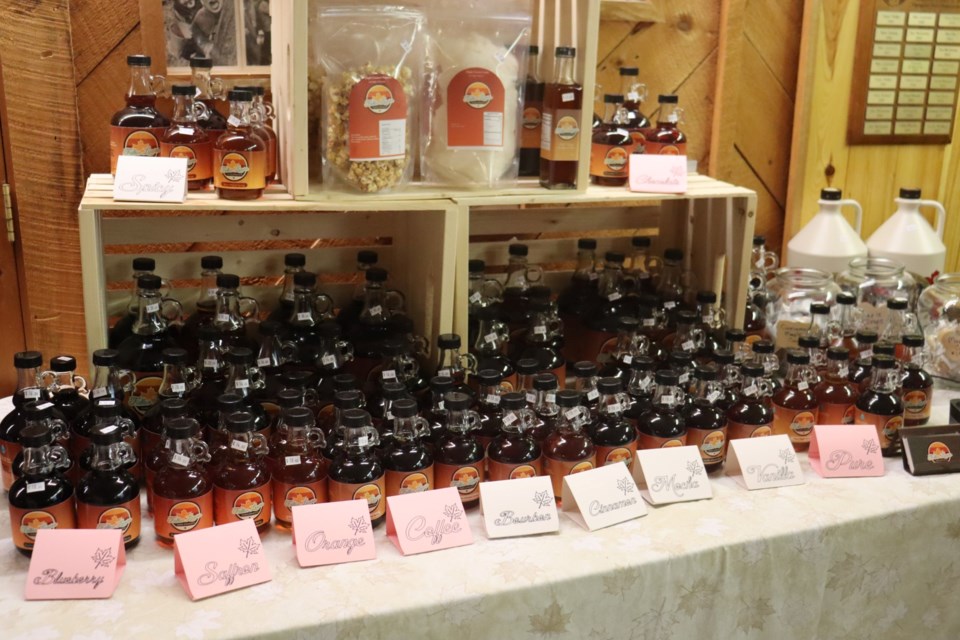Inconsistent temperatures and a lack of snowfall is leaving some local maple syrup producers crossing their fingers heading into the 2023 collection season.
Fallen Leaves Maple Products co-owner Nathan Chevalier says he and his parents Phyllis and Dan have already tapped around 3,000 trees.
Operating for five years on Sixth Line Extension West, the Chevaliers are aiming to collect 500 gallons worth of syrup when all is said and done – so long as the conditions cooperate in the coming weeks.
“We’re completely dependent on the weather,” Nathan Chevalier says. “It’s off to a slow start so far, but hopefully in the next couple of weeks it should pick up quite a bit.”
“We’re not worried yet, there’s still a lot of snow packed, which helps the season last longer.”
Collecting 300 gallons last year, the Chevaliers say they were still active into the first or second week of May 2022.
“If the weather stays this way, we may be looking at something similar this year,” he says.
“A couple weeks ago, we anticipated we’d be boiling now, but we’re not because it’s frozen up. It does make it a little trickier planning for some things, but it’s like any agricultural business – you just have to roll with the weather.”
Meanwhile, Calvin Gilbertson from Gilbertson’s Maple Products on St. Joseph Island says his team has tapped around 40,000 trees this year.
“We had two guys do all the tapping,” Gilbertson says. “It took 25 days – they did an excellent job.”
Ready to go since February, Gilbertson’s has boiled five times and made 1500 gallons of syrup – roughly 10 per cent of what they hope to produce this season.
“The season really hasn’t come into full swing yet, so we’re still waiting for that consistent spring-like weather,” he says.
Operating since 1936, Gilbertson’s says 2022 was the best year they ever had on record, and they’re hoping to measure up again this season.
“By the end of this week, it looks like we’ll get some good weather,” he says. “We can make a lot of syrup if we get the right weather in the next couple of weeks. We’ll wait and see.”
In Goulais River, the team at Hogan’s Homestead are tapping over 30,000 trees in their sugar bush.
Co-owners Erica and Spencer Hogan were impressed with how much syrup they were able to collect before the season’s official start, but inconsistent conditions in recent weeks are leaving question marks heading into the beginning of spring.
“Mother nature is playing some weird tricks on us but we’re waiting for the sap to really start flowing,” Erica Hogan says. “We’ve had about two runs so far so we can’t complain.”
“Right now, where this weather’s at, we’re not really in season yet. We’re getting a little sap right now, but we’re not in full swing. It’s like pre-season.”
Last week, the Hogans tallied nearly eight 650-pound barrels of maple syrup, which is significantly less than their usual numbers at this time of year.
“Having more snow would be ideal since it acts as insultation,” she says. “With more snow as the warmer weather progresses keeps roots insulated to prolong the season.”
“You want to have plus-4 temperatures during the day and minus-4 temperatures at night, give or take, for an ideal collection temperature.”
The goal for Hogan’s Homestead each year is 180 barrels – or 117,000 pounds – of syrup, which they say is enough to comfortably sustain their farming operations and maintain their staffing levels.
While they can’t control the everchanging weather patterns, Hogan explains there are other variables they can manage.
“We’ve added a lot of technology to our sugar bush, so we can actually watch the bush itself and the vacuum system from our phones,” she says. “It helps because it will alert us of any issues, and we can monitor the weather trends.”
“If a line breaks or a squirrel chews it or a tree falls, that sensor will show low pressure, and then we can go into that area within a specific radius and locate the problem.”
Preparing for the worst and hoping for the best, the Hogans are one of many maple syrup makers in the area who are ready to get to work.
“You have to bank on the bad years and hope for the good years,” she says. “Whatever we can do to ensure the most amount of harvest in that season is important.”
